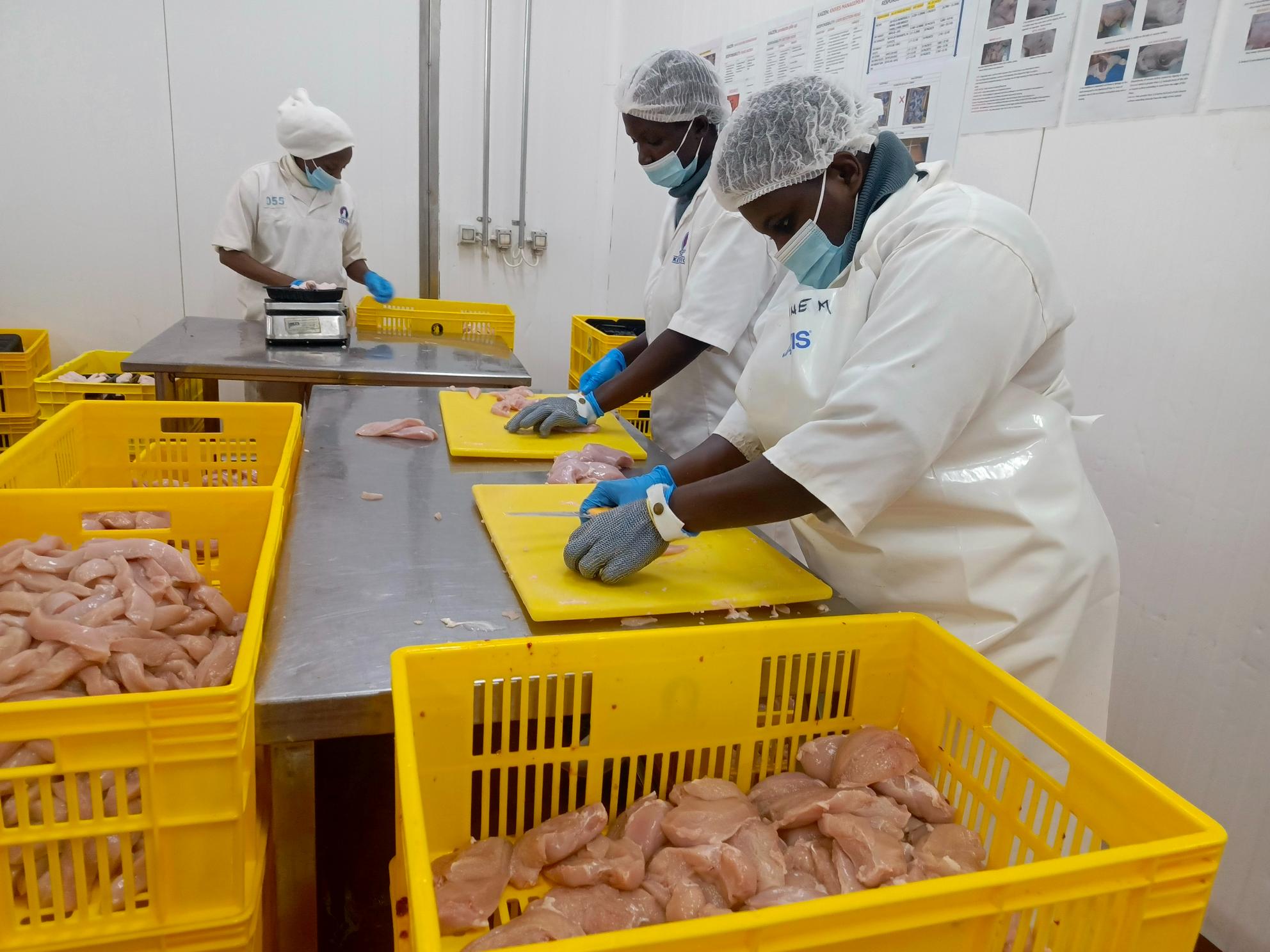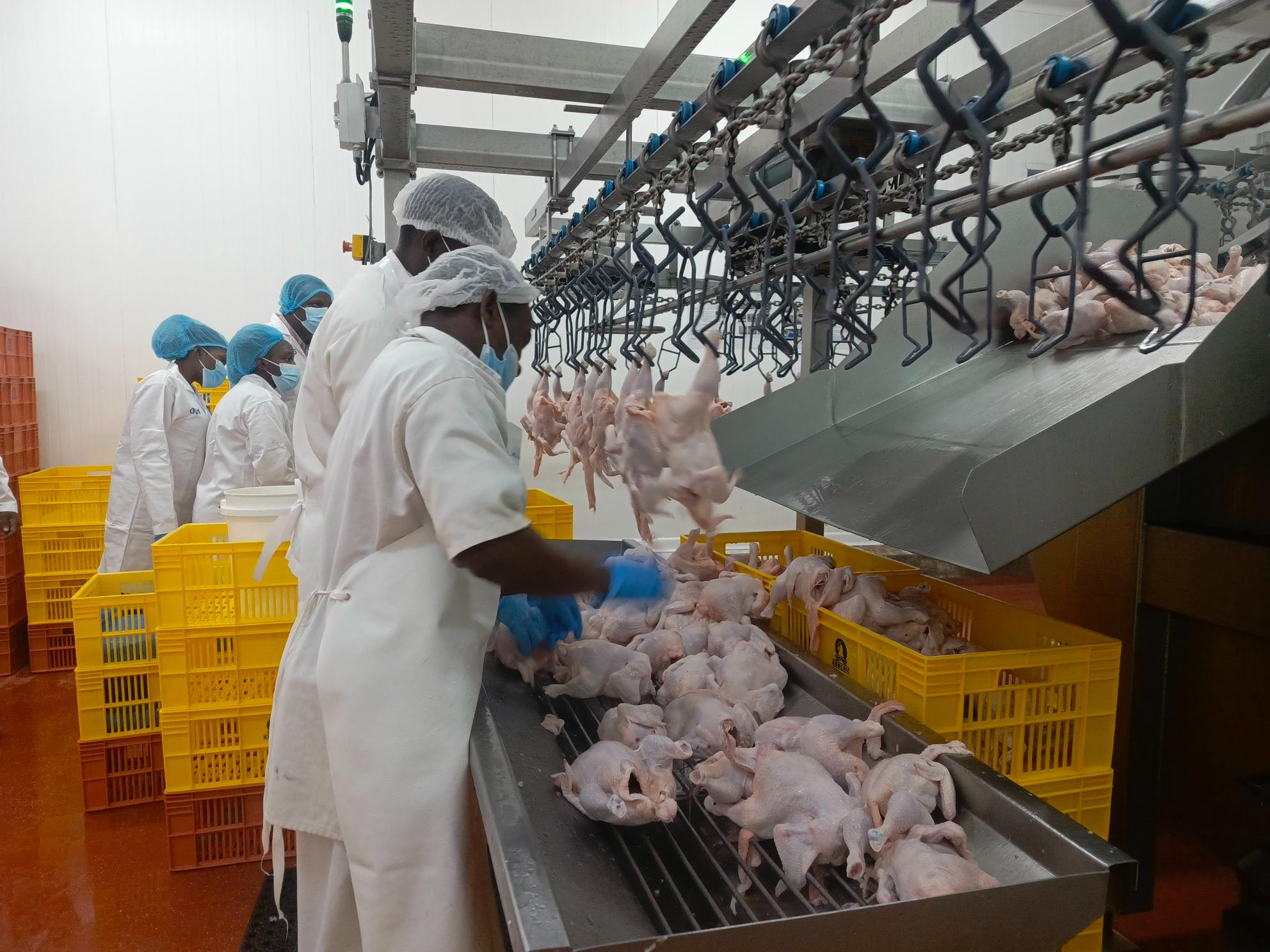
 Workers at Kenchic Processing Plant in Thika, Kiambu county/AGATHA NGOTHO
Workers at Kenchic Processing Plant in Thika, Kiambu county/AGATHA NGOTHO  Workers at Kenchic Processing Plant in Thika, Kiambu county /AGATHA NGOTHO
Workers at Kenchic Processing Plant in Thika, Kiambu county /AGATHA NGOTHO On the outskirts of Nairobi, about 10 kilometres from CBD is the Kenchic Processing Plant, where food safety isn’t just a regulatory checkbox, it is a culture, a science and a commitment.
Kenchic factory manager and food safety lead Brenda Njeri says they are raising the bar on how chicken is produced, handled and consumed in Kenya—from biosecure farms to supermarket shelves.
She says a lot of effort and work goes to ensuring the chicken that ends up the plate is not only delicious but safe and responsibly produced.
Njeri says food safety is embedded in every step of their operations, a philosophy that has earned the plant global recognition.
“We are FSSC 22000 certified,” she says, referencing the Food Safety System Certification recognised worldwide.
“We’re currently certified at version 6.0 , which is the highest standard, so far.”
She says their commitment goes beyond technical compliance.
“The company is also halal certified by the Kenya Bureau of Halal Certification, ensuring slaughtering and handling procedures meet strict religious guidelines. Both the FSSC and halal certifications are audited annually, maintaining transparency and accountability,” Njeri explains.
“We also invest heavily in training our staff to build a culture of food safety,” Brenda points out.
“From breeder farms to the final customer delivery, every handler is trained on Kenchic’s standards. Food safety is everyone’s responsibility.”
That includes responding to customer concerns and any compliance related to quality or food safety must be resolved within 48 hours. Njeri says and, in some cases, customers are invited to the plant to see the corrective measures implemented.
“It's not just about selling chicken,” she says.
“We want our customers to know, and feel that what ends up on their plate is safe and clean. We even changed our slogan from 'farm to fork' to 'farm to your family' to make that connection more personal.”
According to the Africa Poultry Development, Kenya’s egg consumption is 2.5 kilos per person, per year, compared to South Africa, which is at 6kg per person, per year. Tanzania, Uganda, Rwanda and Ethiopia are lower than Kenya.
Additionally, Kenya’s poultry meat consumption is just under two kilos per person, per year compared to other developed countries like US, UK, China, Japan and UAE.
Njeri says there is also a robust traceability system. “Every cut of Kenchic chicken can be traced back not just to the farm, but to the hatchery, the egg and even the grandparent flock. This is a level of detail that’s rare in Kenya’s food production industry,” she says.
On antibiotic resistance, she says one of the company’s most urgent concerns is combating antimicrobial resistance (AMR), a growing public health threat worldwide.
“We're very strict about the use of antibiotics,” Brenda says.
“In fact, getting our current certification required proving that our products are free from harmful antimicrobial residues.”
Kenchic partners with veterinarians and health experts to educate consumers on the dangers of overusing antibiotics in food production.
She points out that prolonged exposure to antibiotic residues in meat can lead to resistance, making common infections harder or even impossible to treat.
“In the worst cases, doctors run out of treatment options,” Brenda notes.
“People fall ill and nothing works. It all comes back to what's on your plate. That’s why Kenchic tests its products regularly (weekly and monthly) for microbial contamination and other food safety risks. The company also validates its shelf-life claims, ensuring that chicken remains safe to consume until the expiration date,” she adds.
Dr Ronald Okindo, assistant director Veterinary Services at the State Department of Livestock, says food safety starts at the source. “Birds are checked at the farm before they're moved. They arrive at the plant with movement permits and we perform antimortem and postmortem inspections.”
He says every bird is inspected to ensure it’s fit for human consumption. After slaughter, the cold chain, a system that maintains safe temperatures, is carefully monitored all the way to delivery.
“Breaking the cold chain can lead to bacterial multiplication,” Okindo explains.
“That’s where food poisoning risks come in.”
Meat is sold with the proper documentation, including the certificate of transport, which confirms the chicken has been inspected and is safe.
Njeri and Okindo say consumers have a vital role in ensuring food safety.
“Ask questions,” Brenda advises.
“Know where your food is coming from, how it's processed and whether it's certified.”
Okindo said consumers should ask for transport permits and that’s how one knows the meat has been inspected.
He also calls on poultry farmers to adopt better animal husbandry practices to reduce the need for antibiotics.
“Cleanliness, vaccination and regular vet consultations can go a long way. Don't just use antibiotics without guidance,” Okindo says.
Njeri notes a shift in Kenyan eating habits, adding that with growing awareness around lifestyle diseases and diet-related health concerns, more Kenyans are choosing chicken and other white meats over red meats. She says Kenchic has seen a rise in demand, which she views as a sign of shifting consumer preferences.
She says people are becoming more health-conscious. “But when they choose Kenchic chicken, they’re choosing quality and safety. As Kenchic continues to invest in innovation, training and traceability, it’s important to know what you eat,” she says.
“For Kenyan consumers navigating crowded meat markets and supermarket shelves, ask questions and demand safe food as this could be the difference between risk and reassurance.”
















